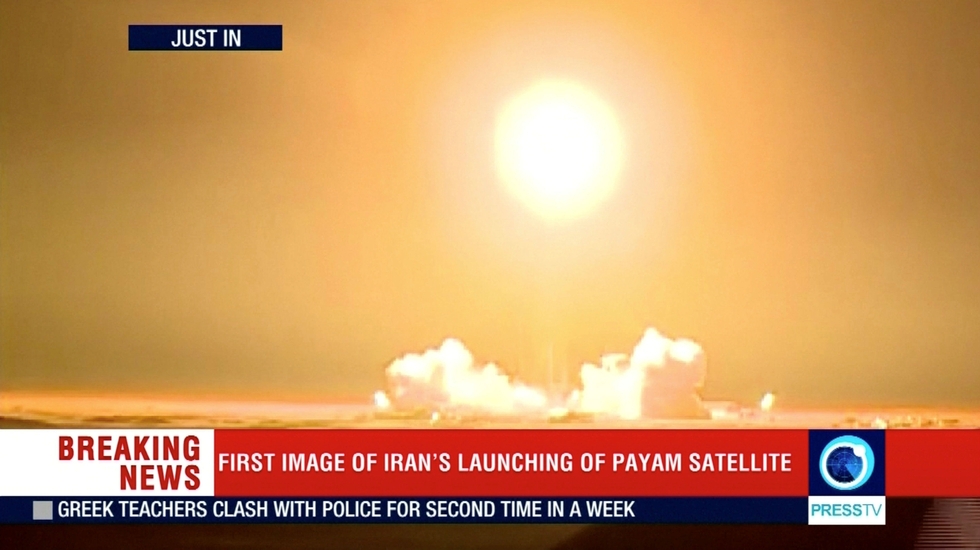Iranian satellite fails to reach orbit, but test draws US condemnation

An Iranian bid to launch a satellite has failed, Telecoms Minister Mohammad Javad Azari-Jahromi said on Tuesday, in a move that was criticised by the United States as a breach of the nuclear deal from which Washington withdrew last year.
Azari-Jahromi said the satellite, named Payam, failed in the third stage of the launch because it "did not reach adequate speed", according to a report on the ministry's website.
The satellite was intended to be used for imaging and communications purposes, and was mounted with four cameras, according to the report. It was planned to stay at an altitude of 500km for approximately three years.
Iran will wait for no country's permission to conduct such scientific projects
- Bahram Ghasemi, Iranian foreign ministry spokesman
Both the Payam and its carrier were designed and produced at Tehran's Amirkabir University of Technology. University head Ahmad Motamedi said the school had already received an order for a replacement, Mehr news agency reported.
"We should not come up short or stop," Azari-Jahromi wrote on Twitter after announcing the failed launch. "It's exactly in these circumstances that we Iranians are different than other people in spirit and bravery."
The US had warned Tehran earlier this month against undertaking three planned rocket launches that it said would violate a UN Security Council resolution because they use ballistic missile technology.
Washington has said that the long-range ballistic technology used to put satellites into orbit could also be used to launch warheads.
Later on Tuesday, US Secretary of State Mike Pompeo accused Iran of defying the international community and the United Nations by carrying out the launch.
"The launch yet again shows that Iran is pursuing enhanced missile capabilities that threaten Europe and the Middle East," he wrote on Twitter.
National pride
Iran, which considers its space programme a matter of national pride, has said space vehicle launches and missile tests are not violations and would continue.
Another satellite named Doosti is waiting to be launched, Azari-Jahromi wrote in a Twitter post.
He did not give a date for the launch, but said the Doosti was intended to orbit the earth at an altitude of 250km.
"We will do our best to place it in the orbit," he said.
Iran launched its first domestically built satellite, the OMID (Hope) research and telecoms satellite, in 2009 on the 30th anniversary of the country’s 1979 Islamic Revolution.
The 40-year anniversary of the Islamic Revolution falls in February this year.
Under the UN Security Council resolution that enshrined Iran’s 2015 nuclear deal with world powers - which Washington pulled out of last spring - the country is "called upon" to refrain from work on ballistic missiles designed to deliver nuclear weapons for up to eight years.
Security Council Resolution 2231 calls on Iran to refrain from testing missiles designed to be able to carry a nuclear weapon, but does not specifically bar Tehran from missile or rocket launches.
Iran's satellite-delivery rockets use technology "virtually identical" to nuclear-capable ballistic missiles, Pompeo said on 3 January.
"The United States will not stand by and watch the Iranian regime's destructive policies place international stability and security at risk," he said at the time.
Tehran denied the planned launch was a violation of Resolution 2231.
"The satellite is part of a civil project with purely scientific aims," foreign ministry spokesman Bahram Ghasemi told the semi-official ISNA news agency.
"Iran will wait for no country's permission to conduct such scientific projects."
The Payam satellite, first designed over a decade ago, was initially expected to be launched on a foreign-manufactured rocket, project manager Mostafa Safavi told ISNA in an interview published just hours before the launch.
"The Payam is a non-military satellite with a non-military mission but some countries, thinking that it could have a military purpose, showed no enthusiasm for launching Iranian satellites," Safavi said.
"When they did not cooperate for non-technical reasons, the satellite's specifications were altered and made ready for a domestic launcher," he added.
Iran has launched several short-life satellites into orbit over the past decade, including the Simorgh and the Pajouhesh.
Stay informed with MEE's newsletters
Sign up to get the latest alerts, insights and analysis, starting with Turkey Unpacked
Middle East Eye delivers independent and unrivalled coverage and analysis of the Middle East, North Africa and beyond. To learn more about republishing this content and the associated fees, please fill out this form. More about MEE can be found here.




